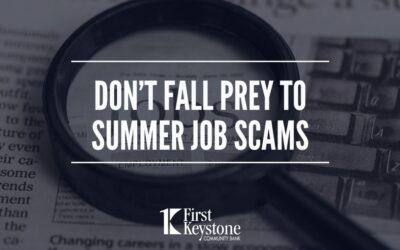Stay Safe While Keeping Your Money Safe
With the Coronavirus impacting just about every facet of daily life, this is the perfect climate for scammers to take advantage by using fear and worry to con people out of their hard-earned money. To keep you and your money safe, we have assembled a list of the current scams related to the Coronavirus and tips on how to protect yourself from becoming a victim.
THE SCAM: Supply and Medical Help Scams
There is an increasing number of scammers impersonating health-related organizations and businesses with the sole purpose of gathering your personal and financial information. They claim to sell test kits, supplies, vaccines, and air filter systems designed to remove COVID-19 from the air in your home. Phishing emails may even claim to be official medical alerts by supplying sketchy links to information about the virus and maps showing the spread of the disease. These links frequently contain dangerous malware which can damage your computer or gather personal information.
WHAT YOU CAN DO: If you receive a phone call, email, text message, or letter with claims to any of the above- it’s a scam. For updates, navigate to official sites only. Never open or click on any links in an email you were not expecting or do not know the sender.
THE SCAM: Fake Coronavirus-Related Charity Scams
Fraudsters, pretending to be from reputable charities, may call you seeking donations. You may also receive a call “following up” on a donation that you never made. Be careful about any charity calling for help. It’s not the usual way legitimate charities will ask for your support.
WHAT YOU CAN DO: If someone requests a donation in cash, by gift card, or by wiring money, DON’T DO IT. If you want to contribute to a charity, visit the website of that organization to make your donation. This will ensure your money is going directly to that charity.
THE SCAM: Scams Targeting Social Security Benefits
The Social Security Office of the Inspector General is warning the public about beneficiaries receiving letters stating that SSA or SSI payments will be suspended or discontinued unless the recipient calls the phone number provided in the letter. When the number is called, the scammers then request (or demand) that you provide personal information to maintain your regular benefit payments. They may also request payments via retail gift cards, wire transfers, internet currency, or even by mailing cash. Any communication that says the Social Security Administration will suspend or decrease SSA or SSI benefit payments due to the current pandemic is a scam.
WHAT CAN YOU DO: If you receive a letter, text, call or email about an alleged problem with your social security number, account or payments, DO NOT RESPOND. Report a suspected Social Security scam to the Inspector General online at oig.ssa.gov.
THE SCAM: Medicare Scam Alert
The Center for Medicare and Medicaid Services has issued a warning that scammers may use the pandemic to steal Medicare numbers, banking information, or other personal data. If you receive Medicare and receive a request for your Medicare information by phone, email or text message it’s a scam. The Medicare office will never call you to enroll you in a program or request personal information.
WHAT YOU CAN DO: Guard your Medicare card as if it were a credit card. Beneficiaries should protect themselves by only giving their Medicare number to their doctor, pharmacist, hospital, healthcare provider, or health insurer. Also, be sure to check your Medicare claim summaries for errors and questionable amounts. If you suspect Medicare fraud, please report it by calling Medicare’s toll-free customer service center at 1-800-MEDICARE (1-800-633-4227) or at www.medicare.gov.
THE SCAM: Economic Impact Payment Scams or Stimulus Payment Scam
While everyone is waiting to hear about their Economic Impact Payment, criminals are working hard to get their hands on it. There’s a surge of calls and email phishing attempts trying to convince taxpayers to provide their direct deposit or other banking information, claiming that if they do, they will receive their funds faster. Taxpayers do not need to supply this information to others so it can be input in a “secure portal” on their behalf. In most cases, the IRS will deposit payments in the direct deposit account taxpayers provide on their tax returns. By mid-April, those taxpayers who have not provided their direct deposit information will be able to do so online at a newly designed secure portal at IRS.gov. If the IRS does not have a taxpayer’s direct deposit information, a check will be mailed to the address on file. Visit the IRS website to learn more about the Economic Impact Payments.
WHAT YOU CAN DO: Seniors should be especially careful during this period. The IRS will not be reaching out to them by phone, email, or in person asking for any kind of information to complete their Economic Impact Payment. The payments will be issued automatically – no additional action or information is needed. If you receive one of these unsolicited emails, phone calls or text messages that appear to be from either the IRS or an organization closely linked to the IRS, such as the Electronic Federal Tax Payment System (EFTPS), please forward it to [email protected]
THE SCAM: Offers of Assistance
According to the CFPB’s website, if you’re an older adult or a caregiver for one, you may need help picking up groceries, prescriptions, and other necessary supplies. If someone you don’t know offers to help, be wary. Some scammers offer to buy supplies but never return with the goods or your money.
WHAT YOU CAN DO: It’s safer to find a trusted friend or neighbor or arrange a delivery with a well-known company. Do not trust a stranger with these important tasks.
To sum it up, here’s the steps you can take to avoid becoming a victim.
- Ignore offers for a Coronavirus or COVID-19 vaccine, cure or treatment. Scammers are trying to get you to buy products that are not proven to treat or prevent the Coronavirus disease. At this time, there are no FDA approved home treatments. You can visit the FDA website to learn more.
- Rely on official sources for the most up-to-date information. Visit the Center for Disease Control and Prevention, World Health Organization and the Commonwealth of Pennsylvania Health Department website for the latest developments.
- Remember that the safest place for your money is IN THE BANK. Your funds are secure and insured by the Federal Deposit Insurance Corporation (FDIC).
- Avoid bogus website links. Place your mouse over any suspicious links to view the actual website (URL) that you are being routed to. Fraudulent links are often disguised by simple changes in the URL (for example: www.ABC-Bank.com versus www.ABC_Bank.com.)
- Make online purchases from reputable companies only. Online sellers may claim to have masks, cleaning products, health, and medical supplies when they don’t. Once you make the payment, getting your money back will be next to impossible.
- Exercise extreme caution before making any investments and be wary of any company claiming they can prevent, detect or cure Coronavirus. For more information on prudent investment strategies, visit the U.S Securities and Exchange Commission website or contact your FKCB Financial Advisor.
- Assist anyone who is less computer savvy and may need additional assistance in recognizing and avoiding the scams we’ve just discussed.
- Visit the government’s official website to learn more about what they are doing in response to the Coronavirus COVID-19 Pandemic.
And, most importantly, remember that your First Keystone Community Banker is on duty and available to help you through the difficult days ahead. Now is the time to be “Keystone Strong.”




